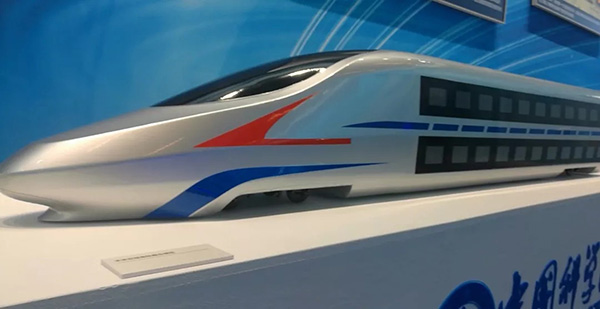


(Photo/Science and Technology Daily)
The Chinese Academy of Sciences has developed a conceptual model for future Chinese double-decker high-speed trains, which is likely to be able to run at speeds as high as 350 kilometers per hour (kph), official WeChat account of Science and Technology Daily reported on Feb.19.
The conceptual model of future double-decker high-speed trains in China has caught widespread attention in the country after it was revealed by media this past Monday.
The double-decker high-speed train technology is aimed at improving the passenger capacity, carrying capacity, and the economic efficiency of high-speed trains, according to Zhang Weihua, a professor of Southwest Jiaotong University, one of China’s top universities.
“As long as we can find solutions to such problems as low center of gravity and high capacity in design and technology, the double-decker high-speed train can probably guarantee speeds as high as 350 kph just as the single-decker high-speed trains do,” said Zhang in an interview with Science and Technology Daily.

(Photo/Science and Technology Daily)
The critical problem of the train’s potential loss of stability caused by the centrifugal force when the train, with a much higher standing train body and heavier load than a single-decker train, takes curves at high speeds. This has been regarded as crucial in the development of the double-decker train.
Zhang explained that so long as the double-decker train has a low center of gravity, when it runs at the specified equilibrium velocity, the centrifugal force and the transverse component of the gravity caused by super elevation will cancel out, which will make the train not only safe, but safer.
As to the problem of how to realize low gravity center and high capacity of the train, Zhang said that Germany’s next generation high-speed train developers hope to achieve good double-deck space in the train by materializing low floor with the help of independent rotating wheel technology.
Besides, the technologies concerning the overall design of the train body, including the arrangement of compartments and seats (or sleeping berths) are also important to the development of the new train.
 Fire brigade in Shanghai holds group wedding
Fire brigade in Shanghai holds group wedding Tourists enjoy ice sculptures in Datan Town, north China
Tourists enjoy ice sculptures in Datan Town, north China Sunset scenery of Dayan Pagoda in Xi'an
Sunset scenery of Dayan Pagoda in Xi'an Tourists have fun at scenic spot in Nanlong Town, NW China
Tourists have fun at scenic spot in Nanlong Town, NW China Harbin attracts tourists by making best use of ice in winter
Harbin attracts tourists by making best use of ice in winter In pics: FIS Alpine Ski Women's World Cup Slalom
In pics: FIS Alpine Ski Women's World Cup Slalom Black-necked cranes rest at reservoir in Lhunzhub County, Lhasa
Black-necked cranes rest at reservoir in Lhunzhub County, Lhasa China's FAST telescope will be available to foreign scientists in April
China's FAST telescope will be available to foreign scientists in April "She power" plays indispensable role in poverty alleviation
"She power" plays indispensable role in poverty alleviation Top 10 world news events of People's Daily in 2020
Top 10 world news events of People's Daily in 2020 Top 10 China news events of People's Daily in 2020
Top 10 China news events of People's Daily in 2020 Top 10 media buzzwords of 2020
Top 10 media buzzwords of 2020 Year-ender:10 major tourism stories of 2020
Year-ender:10 major tourism stories of 2020 No interference in Venezuelan issues
No interference in Venezuelan issues
 Biz prepares for trade spat
Biz prepares for trade spat
 Broadcasting Continent
Broadcasting Continent Australia wins Chinese CEOs as US loses
Australia wins Chinese CEOs as US loses